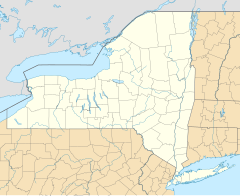Rip Van Winkle Bridge
| Rip Van Winkle Bridge | |
|---|---|

Crossing the bridge eastbound in the summer
|
|
| Coordinates | 42°13′25″N 73°51′01″W / 42.22358°N 73.85038°WCoordinates: 42°13′25″N 73°51′01″W / 42.22358°N 73.85038°W |
| Carries |
|
| Locale | Hudson, New York and Catskill, New York |
| Maintained by | New York State Bridge Authority |
| Characteristics | |
| Design | Cantilever and truss |
| Total length | 5,040 ft (1,536.5 m) |
| Width | 30 ft (9.1 m) |
| Longest span | 800 ft (243.8 m) |
| Clearance below | 145 ft (44.2 m) |
| History | |
| Opened | 1935 |
| Statistics | |
| Daily traffic | 15,000 |
| Toll | $1.50, eastbound only |
The Rip Van Winkle Bridge is a cantilever bridge spanning the Hudson River between Hudson, New York and Catskill, New York. The structure carries NY 23 across the river, connecting on the west side, US 9W and NY 385 with NY 9G on the east side. The bridge was built by the newly created New York State Bridge Authority, opening on July 2, 1935, at a cost of $2.4 million ($41,920,000 with inflation). Upon its opening, the toll was $0.80 ($13.97 with inflation) per passenger car and $0.10 ($1.75 with inflation) per passenger up to $1 ($17.47 with inflation). The current toll for autos is $1.50 for eastbound traffic only. The bridge extends 5,040 feet (1536 m) across the river, with a ship clearance of 145 feet (44 m).
The bridge is named after the 1819 short story of the same name by Washington Irving, which mentions the cities of Hudson and Catskill.
A multi-year repainting project was completed in 2009 which removed all lead-based paint.
The bridge includes a pedestrian walkway on the south side of the bridge which is open from dawn to dusk. Cyclists may use the roadway or may walk their cycles across the pedestrian walkway.
...
Wikipedia

